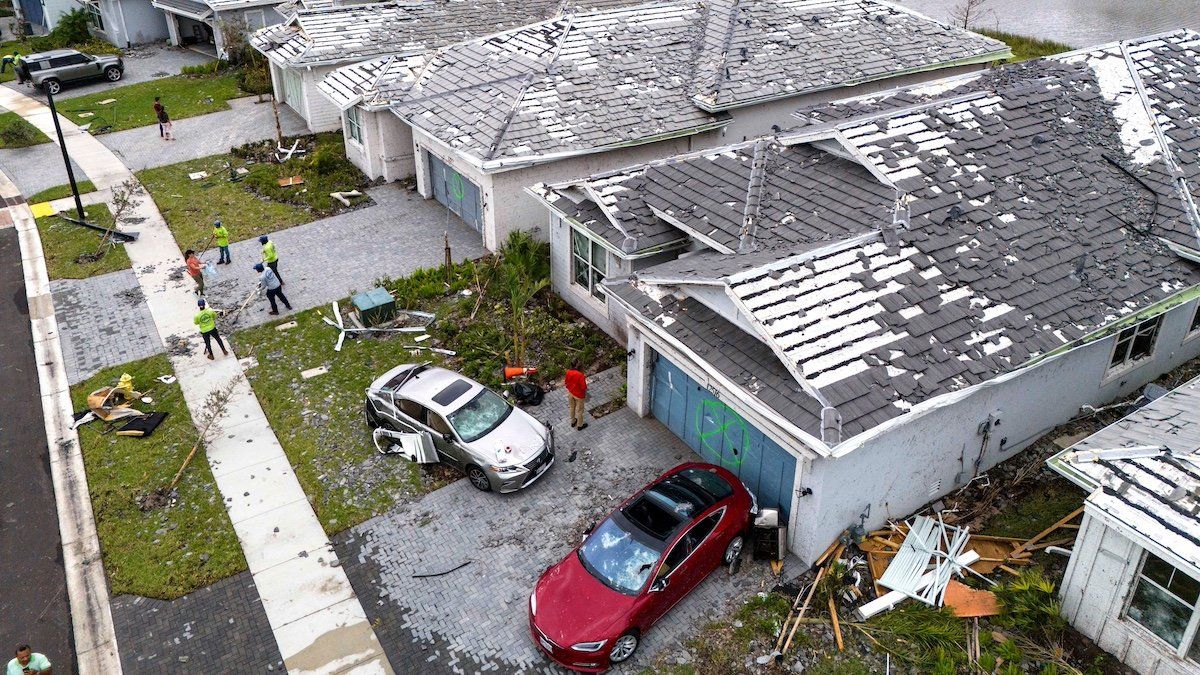The real victims of the deadly hurricanes Helene and Milton are the citizens of Florida, North Carolina, and four other states. Republicans and Democrats alike. Hurricanes don’t distinguish between voters, and all people are deserving of the same level of support. At least 230 people were killed by Hurricane Helene just weeks ago, and now, as I write this, the carnage of Milton, which just ripped through Florida, is still being assessed. How these victims vote should have no place in the discussion.
Georgia Rep. Marjorie Taylor Greene, aka MTG, has pitched a different theory: She believes the real victims of the hurricanes are Republicans, who are being targeted by Democrat-controlled storms to tilt election results.
“Yes they can control the weather,” she wrote on X after Hurricane Helene. “Anyone who says they don’t, or makes fun of this, is lying to you. By the way, the people know it and hate all of you who try to cover it up.”
Who are “they,” exactly?
MTG explained on social media that the hurricanes are partly controlled by the National Oceanic and Atmospheric Administration (I assume that is …“Deep Weather”?). Then she brought out the maps for the kicker.
“This is a map of hurricane affected areas with an overlay of electoral map by political party shows how hurricane devastation could affect the election,” she wrote on X, suggesting that Republican voting districts are being targeted by the … Democrat-controlled hurricanes.
A few months back, I wrote an article called “Fake Clouds, Seeding Doubt” to debunk the weather conspiracy about a well-known program called cloud seeding that has been used to promote small amounts of rain in drought-prone areas. It has been used for more than 50 years and is not even close to controlling the weather with massive hurricanes. That is all paranoid nonsense, but very much on-brand for a Category 5 conspiracy theorist like MTG. Who can forget her 2018 antisemitic theory that Jewish-controlled space lasers caused forest fires?
As Ian Bremmerwrote yesterday, the disinformation surrounding the genuine FEMA support for the victims of Hurricane Helene has proven dangerous, but it is just part of a bigger storm surge of campaign disinformation about everything from abortion to immigration to taxes to crime. Beneath it all, there is one strategy: Make your supporters feel like victims.
This is an old political tactic because it bonds a tribe of voters with a sense of identity against perceived and real threats, and, more importantly, it provides moral validation for counter-action. If the system is stacked against you, then any response — including, say, peaceful or violent protests — becomes justified. Vandals become activists. Insurrectionists are transformed into patriots.
A strategically cultivated sense of victimization is where the extremes on the right meet the extremes on the left. Some left-wing groups discovered the benefits of self-declared victimization long ago, and they have used it as a cudgel to silence debate, destroy property, and create odious conditions of political correctness.
Some groups on the right see themselves as constantly targeted by Big Pharma, Big Tech, fake media, biased justice systems — and now, by hurricanes.
This dynamic played out in painful ways on Oct. 7, marking one year since the brutal massacre of 1,200 innocent people in Israel and the kidnapping of 250 more by the terror group Hamas. For many in Israel and around the globe, the anniversary of Oct. 7 was a day to remember and honor those victims of Hamas.
But for some who have criticized Israeli Prime Minister Benjamin Netanyahu’s policy toward Palestinians and see his military actions in Gaza as an illegal form of collective punishment, Oct. 7 was a day of resistance.
Each side made the case that they are the real victims and therefore their response is justified, but in the endless regression of victimization and partisanship — you did this, but you did that first, etc. — basic morality got lost. One case of victimization doesn’t invalidate another.
Protesting Israel’s war tactics in Gaza against Hamas and the horrifically high civilian death toll is valid in any democracy — and it’s as common an occurrence inside Israel as it is outside of it. But should that prevent the acknowledgment and condemnation of the massacre of 1,200 innocent people in Israel? Should that disqualify a sovereign country’s right to self-defense against a terror group?
At its worst, the self-identifying of victimhood can be used to lend a moral fig leaf to cruel actions, but even victims of the worst violence must adhere to the rule of law, the rules of war, and the protection of human rights. That is not a sign of weakness in a society, but a sign of strength.
It also doesn’t mean you have to fall into the trap of false moral equivalency or mealymouthed both-sidesism. Calling out lies or excesses does not always reveal political bias, but an adherence to facts and humanity.
In the military, one of the worst sins is stolen valor, when someone pretends to have done things they didn’t do or pretends to have served when they didn’t. On the campaign trail, we see something else: stolen victimization.
Instead of focusing on the actual victims of violence — or weather — the stolen-victim folks make it all about them, hoarding the attention so it can be used for their political agendas, treating the suffering of people as props for their latest campaign.
In the hurricane of voices on the extreme right and left claiming the mantle of victimization, the partisanship divides grow deeper, and what democracies need most to solve problems gets lost: basic empathy.
